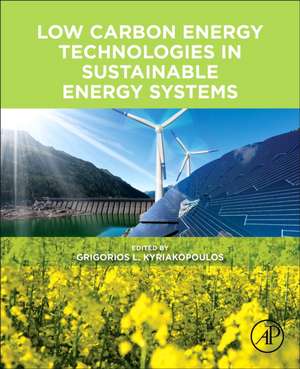Low Carbon Energy Technologies in Sustainable Energy Systems
Editat de Grigorios L. Kyriakopoulosen Limba Engleză Paperback – 12 ian 2021
- Combines socio-cultural perspectives, environmental sustainability, and economic feasibility in the analysis of low carbon energy technologies
- Assesses regulatory governance impacting the environmental protection and the social cohesion of environmentally-directed energy markets
- Reviews the carbon trade exchange, attributing economic value to carbon and enabling its trading perspectives by people, companies or countries invested in low carbon technologies
Preț: 606.49 lei
Preț vechi: 790.15 lei
-23% Nou
Puncte Express: 910
Preț estimativ în valută:
116.07€ • 120.73$ • 95.82£
116.07€ • 120.73$ • 95.82£
Carte tipărită la comandă
Livrare economică 07-21 aprilie
Preluare comenzi: 021 569.72.76
Specificații
ISBN-13: 9780128228975
ISBN-10: 0128228970
Pagini: 418
Dimensiuni: 191 x 235 x 27 mm
Greutate: 0.72 kg
Editura: ELSEVIER SCIENCE
ISBN-10: 0128228970
Pagini: 418
Dimensiuni: 191 x 235 x 27 mm
Greutate: 0.72 kg
Editura: ELSEVIER SCIENCE
Cuprins
Part 1 Introduction and fundamentals
1. The role of resource recovery technologies in reducing the demand of fossil fuels and conventional fossil-based mineral fertilizers
2. Increasing efficiency of mining enterprises power consumption
3. The contribution of energy crops to biomass production
Part 2 Examining low carbon energy technologies and their contribution as sustainable energy systems
4. Public attitudes toward the major renewable energy types in the last 5 years: A scoping review of the literature
5. Understanding willingness to pay for renewable energy among citizens of the European Union during the period 2010–20
6. Linking energy homeostasis, exergy management, and resiliency to develop sustainable grid-connected distributed generation systems for their integration into the distribution grid by electric utilities
7. Smart energy systems and the need to incorporate homeostatically controlled microgrids to the electric power distribution industry: an electric utilities’ perspective
8. Grid-tied distributed generation with energy storage to advance renewables in the residential sector: tariffs analysis with energy sharing innovations
9. Integrating green energy into the grid: how to engineer energy homeostaticity, flexibility and resiliency in electric power distribution systems and why should electric utilities care
10. Multi energy systems of the future
11. Bibliometric analysis of scientific production on energy, sustainability, and climate change
12. Public acceptance of renewable energy sources
13. Sustainable site selection of offshore wind farms using GIS-based multi-criteria decision analysis and analytical hierarchy process. Case study: Island of Crete (Greece)
14. Accounting and Sustainability
Part 3 Conclusions and future research
15. Should low carbon energy technologies be envisaged in the context of sustainable energy systems?
1. The role of resource recovery technologies in reducing the demand of fossil fuels and conventional fossil-based mineral fertilizers
2. Increasing efficiency of mining enterprises power consumption
3. The contribution of energy crops to biomass production
Part 2 Examining low carbon energy technologies and their contribution as sustainable energy systems
4. Public attitudes toward the major renewable energy types in the last 5 years: A scoping review of the literature
5. Understanding willingness to pay for renewable energy among citizens of the European Union during the period 2010–20
6. Linking energy homeostasis, exergy management, and resiliency to develop sustainable grid-connected distributed generation systems for their integration into the distribution grid by electric utilities
7. Smart energy systems and the need to incorporate homeostatically controlled microgrids to the electric power distribution industry: an electric utilities’ perspective
8. Grid-tied distributed generation with energy storage to advance renewables in the residential sector: tariffs analysis with energy sharing innovations
9. Integrating green energy into the grid: how to engineer energy homeostaticity, flexibility and resiliency in electric power distribution systems and why should electric utilities care
10. Multi energy systems of the future
11. Bibliometric analysis of scientific production on energy, sustainability, and climate change
12. Public acceptance of renewable energy sources
13. Sustainable site selection of offshore wind farms using GIS-based multi-criteria decision analysis and analytical hierarchy process. Case study: Island of Crete (Greece)
14. Accounting and Sustainability
Part 3 Conclusions and future research
15. Should low carbon energy technologies be envisaged in the context of sustainable energy systems?
